A Feast of Christmas Authors
by Sue Wilkes
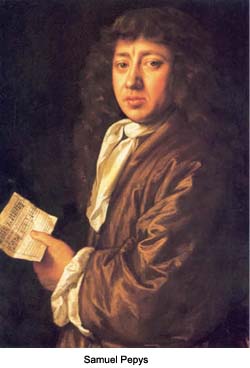 Our images of Christmas are defined
by Charles Dickens' A Christmas Carol: we picture a
Victorian street knee-deep in snow, tables groaning with goodies,
and Tiny Tim's blessing. But many other writers and diarists have
left their own memorable impressions of the festive season. Our images of Christmas are defined
by Charles Dickens' A Christmas Carol: we picture a
Victorian street knee-deep in snow, tables groaning with goodies,
and Tiny Tim's blessing. But many other writers and diarists have
left their own memorable impressions of the festive season.
The 'first course' to add spice to our Christmas feast is diarist
Samuel Pepys (1633-1703.) Pepys kept an extremely frank journal,
written in special shorthand. The Plague Year, the Great Fire of
London, the ups and downs of married life with wife Elizabeth and
his many love affairs are all faithfully recorded. All seemed
well, though, on Christmas Day, 1663:
Up and to church, where Mr Mills made an ordinary sermon; and
so home and dined with great pleasure with my wife... and then I
begin to read to my wife upon the globes, with great pleasure and
to good purpose, for it will be pleasant to her and to me to have
her understand these things...(Illustrated Pepys, ed.
R. Latham, Book Club 1979.)
The next Christmas was less harmonious; Pepys enjoyed a new lover
and blacked his wife's eye, but congratulated himself on having
'a pretty quiet and loving family.' (31 Dec 1664.)
He had a soft spot for some newlyweds: 25 Dec. 1665. To church
in the morning, and there saw a wedding in the church... and
strange, to see what delight we married people have to see these
poor fools decoyed into our condition, every man and wife gazing
and smiling at them.
1666, the year of the Great Fire, must have been a time of great
distress to many families in the capital, still recovering from
the massive destruction; luckily, Pepys's house and belongings
had escaped the fire, and he enjoyed a Christmas dinner of
'good ribbs of beef roasted and some mince pies.' His
career in the Navy Board prospered, and next Yuletide saw him
going by coach to see 'the ceremonys' at the Queen's
Chapel and worrying in case his pocket was picked. He found the
Queen's High Mass (Queen Catherine was Catholic) 'too
frivolous' but 'all things very rich and beautiful'
for the service. He arrived home early Christmas morning and
found his wife 'in bed, and Jane and the maids making pyes,
and so I to bed and slept well.'
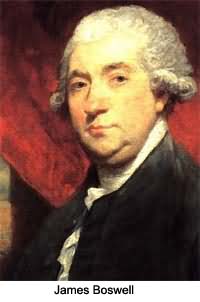 Another writer who kept a journal while living
in London was an impecunious young Scot. In Christmas 1762 James
Boswell (1740 -1795) was 'on the make;' he desperately wanted a
commission in the Guards. He hoped to lead an idle life as an
officer in London, rather than follow in his judge father's
footsteps, and spent much of his time hustling a rich noblewoman,
the Countess of Northumberland, to get a commission for him. He
was also trying to coax a young lady, the 'adorable Louisa,' into
allowing him an 'amorous dalliance.' A literary 'groupie,'
Boswell lived in hope of meeting that great man of letters,
Samuel Johnson. Boswell was on a very tight budget, only dining
well when he could scrounge a meal at a friend's house, but he
contrived to keep cheerful: Another writer who kept a journal while living
in London was an impecunious young Scot. In Christmas 1762 James
Boswell (1740 -1795) was 'on the make;' he desperately wanted a
commission in the Guards. He hoped to lead an idle life as an
officer in London, rather than follow in his judge father's
footsteps, and spent much of his time hustling a rich noblewoman,
the Countess of Northumberland, to get a commission for him. He
was also trying to coax a young lady, the 'adorable Louisa,' into
allowing him an 'amorous dalliance.' A literary 'groupie,'
Boswell lived in hope of meeting that great man of letters,
Samuel Johnson. Boswell was on a very tight budget, only dining
well when he could scrounge a meal at a friend's house, but he
contrived to keep cheerful:
Thurs 23 Dec. I have great spirits. I see how little
a man can live upon... I never can come lower than to live on
bread and cheese. (Boswell's London Journal, ed. F.A.
Pottle, Futura, 1982.)
He enjoyed a 'literary dinner' on Christmas Day at
Davies the bookseller's house, where he met writer Oliver
Goldsmith: '... a curious, odd, pedantic fellow with some
genius... I had seen no warm victuals for four days, and
therefore played a very bold knife and fork... They discussed
the works of Shakespeare and Samuel Johnson; Boswell was
disappointed, because he'd hoped to meet 'Dictionary' Johnson
there. On Boxing Day Boswell was 'stupefied and enraged'
to receive a letter from family friend the Duke of Queensberry,
informing him a commission in the Guards would not be forthcoming
and was a 'fruitless pursuit.' Luckily, the lovely Louisa
made Boswell 'blessed' a week later, but he got much more than he
bargained for. His ambition to meet Johnson was not fulfilled
until May the following year; this fateful meeting led to a
long-lasting friendship and the first modern biography.
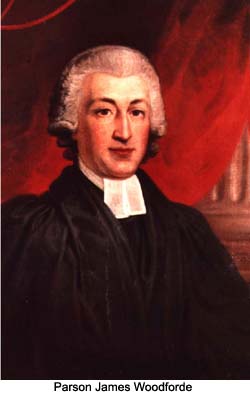 A contemporary of Boswell's
was Parson James Woodforde (1740 -1803.) His diaries, which cover
the years 1758 - 1802, provide a unique record of C.18th rural
life. His pastimes were more innocent than Boswell's. Woodforde
kept his own cows, pigs and poultry at his Parsonage at Weston
Longville, Norfolk; he grew barley and brewed his own beer. But
oh! how cold the winters were then. While Woodforde was a student
at Oxford, the Thames froze over; he often went skating upon
it: A contemporary of Boswell's
was Parson James Woodforde (1740 -1803.) His diaries, which cover
the years 1758 - 1802, provide a unique record of C.18th rural
life. His pastimes were more innocent than Boswell's. Woodforde
kept his own cows, pigs and poultry at his Parsonage at Weston
Longville, Norfolk; he grew barley and brewed his own beer. But
oh! how cold the winters were then. While Woodforde was a student
at Oxford, the Thames froze over; he often went skating upon
it:
January 24, 1763. We skated down to Abington where we dined
and for our dinners etc. each of us paid 2s.6d. We were going
down about an hour and a half... (Diary of a Country
Parson, James Woodforde, OUP, 1984.)
The winters of 1794-5 and 1798-9 were exceptionally frosty
at Weston; the turnips grown to feed livestock over winter froze
like bricks, and had to be split open with a mallet and wedge.
The weather affected the poor Parson's health:
December 25, 1794. It was very cold indeed this morning, and
the Snow in many Places very deep, with an E. Wind. Immediately
after the Morning Service... I was attacked with an Epileptic
Fit and fainted away in my Desk, but thank God! soon recovered...
After service was over I walked into Mr Stephen Andrew's House
and having warmed myself, I walked home...
It was Woodforde's custom to give the poor people of the
parish sixpence each and on Christmas Day he gave the old folk a
splendid dinner of: A very fine Sirloin of Beef rosted
(sic) and plenty of plumb Puddings for dinner and strong
beer after... The parlour window was decorated with boughs of
holly, and the Parson lit his 'great wax-candle.'
The next day saw Woodforde on the mend: I drank plentifully of
Port Wine after dinner, instead of one Glass, drank 7 or 8 Wine
Glasses, and it seemed to do me much good...
The cold weather caused problems in the Parsonage kitchen in
those days before central heating:
December 28, 1798. Frost last night & this
Morning and & all the Day intense -- it froze in every part
of the House even in the Kitchen. Milk and Cream tho' kept in the
Kitchen all froze... Even the Meat in our Pantry all froze &
also our Bread. I think the Cold was never more severe in my
Life.
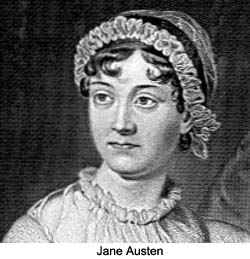 Meanwhile, at Steventon Rectory at Hampshire,
twenty-three-year old Jane Austen (1775 -- 1817) wrote to her
sister Cassandra about the ball she'd enjoyed at the Ashford
Assembly Rooms. She'd been staying with her friend Catherine Bigg
at Manydown. The behaviour of one of the gentlemen present may
have inspired a certain Mr Darcy's standoffish conduct at the
Meryton Assembly in Pride & Prejudice: Meanwhile, at Steventon Rectory at Hampshire,
twenty-three-year old Jane Austen (1775 -- 1817) wrote to her
sister Cassandra about the ball she'd enjoyed at the Ashford
Assembly Rooms. She'd been staying with her friend Catherine Bigg
at Manydown. The behaviour of one of the gentlemen present may
have inspired a certain Mr Darcy's standoffish conduct at the
Meryton Assembly in Pride & Prejudice:
December 24, 1798. I returned from Manydown this
morning... Our ball was very thin, but by no means unpleasant...
Mr Calland... appeared as usual with his hat in his hand, and
stood every now and then behind Catherine and me to be talked to
and abused for not dancing. We teased him, however, into it at
last... There were twenty dances, and I danced them all, and
without any fatigue... My black cap was openly admired... [Jane
kept her letter open, and on Christmas Day she added:] I was to
have dined at Deane today, but the weather is so cold that I was
not sorry to be kept at home by the appearance of snow...
(Jane Austen: Selected Letters 1796-1817, OUP,
1985.)
The threat of snow, however, was not enough to prevent her
heroine Emma from going out to dinner at Randalls on Christmas
Eve:
The cold... was severe; and by the time the second
carriage was in motion, a few flakes of snow were finding their
way down, and the sky had the appearance of being so overcharged
as to want only a milder air to produce a very white world in a
very short time. (Emma, Jane Austen, Penguin Books 1966.)
When the promised snow arrives, Emma and her party hurry home;
but when Emma inadvertently finds herself alone in a carriage
with the obnoxious Mr Elton, she finds herself in danger from
more than the weather: ... scarcely had they passed the
sweep-gate and joined the other carriage, than she found... her
hand seized -- her attention demanded, and Mr Elton actually
making violent love to her...
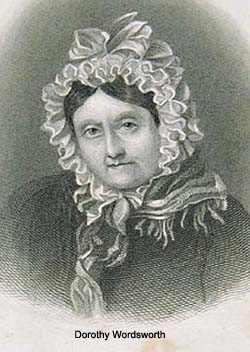 One lady who rarely let the
weather deter her from going out was diarist Dorothy Wordsworth
(1771-1855), sister of William. Dorothy inspired some of his
loveliest poems. In their tiny cottage at Grasmere in the Lake
District she kept house for him, made fair copies of his work,
and accompanied him on immensely long walks. Dorothy, who had a
keen eye for the natural world, kept a journal "to please
William" but although she did not write with an eye to
publication, her prose has a magic of its own: One lady who rarely let the
weather deter her from going out was diarist Dorothy Wordsworth
(1771-1855), sister of William. Dorothy inspired some of his
loveliest poems. In their tiny cottage at Grasmere in the Lake
District she kept house for him, made fair copies of his work,
and accompanied him on immensely long walks. Dorothy, who had a
keen eye for the natural world, kept a journal "to please
William" but although she did not write with an eye to
publication, her prose has a magic of its own:
December 22nd, 1801. Still thaw. ... Wm. and I went to Rydale
for letters, the road was covered with dirty snow, rough and
rather slippery... We stopped to look at the stone seat on top of
the Hill. There was a white cushion upon it, round at the edge...
the Rock behind looked soft as velvet, of a vivid green, and so
tempting! The snow too looked as soft as a down cushion. A young
Foxglove, like a star, in the centre... (Journals of
Dorothy Wordsworth, ed. Helen Darbishire, OUP 1958.)
Despite the wet roads, Dorothy and William went out walking again
on Christmas Eve and Christmas Day, in the evening they sat round
the fireside, reading Chaucer. On Boxing Day they walked to
Rydale again:
It was very pleasant -- Grasmere Lake a beautiful
image of stillness, clear as glass, reflecting all things, the
wind was up, and the waters sounding...
Lord George Gordon Byron (1788-1824) was unlikely to have been
on the Wordsworths' Christmas card list (although they hadn't
been invented yet.) 'Mad, bad' Byron, too, spent a watery
Christmas -- at Venice, in 1816. He and Wordsworth loathed each
other. The two men were poles apart, artistically and morally.
While Wordsworth lived the simple life 'far from the madding
crowd' in the Lakes, struggling to sell his works, Byron was
society's darling, and his poems were bestsellers. But now Byron
had been forced into exile, not only to escape his creditors, but
also the huge scandal over his separation from his wife Annabella
amidst rumours of incest with his half-sister Augusta Leigh. And
it was to Augusta he wrote of his latest escapade with a married
Venetian lady:
December 16th, 1816. ... You are right in saying I
like Venice... the Carnival is to begin in a week -- and with it
the mummery of masking... My present beloved -- is aged two and
twenty -- with remarkably fine black eyes -- and very pretty and
regular features...
The night, even darker than his lady's eyes, nearly led to her
making a splash:
... instead of handing the Lady as in duty bound
into the Gondola -- I as nearly conveyed her into the Canal --
and this at midnight -- to be sure it was as dark as pitch -- but
if you could have seen the gravity with which I was committing
her to the waves -- thinking all the time of something or other
not to the purpose; -- I always forget that the streets are
canals -- and was going to walk her over the water -- if the
servants & the Gondoliers had not awakened me. -- So much for
love... (Lord Byron: Selected Letters and Journals, ed.
Leslie Marchand, (Picador, 1988.)
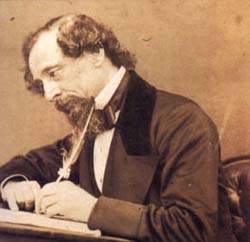 It seems appropriate for Charles Dickens
(1812 -1870) to be the 'final course' of our feast of Christmas
authors. Jane Welsh Carlyle, (1801-1866) wife of writer Thomas
Carlyle, gives us a wonderful picture of Dickens as a magician at
a child's birthday party, in the month when A Christmas
Carol was published: It seems appropriate for Charles Dickens
(1812 -1870) to be the 'final course' of our feast of Christmas
authors. Jane Welsh Carlyle, (1801-1866) wife of writer Thomas
Carlyle, gives us a wonderful picture of Dickens as a magician at
a child's birthday party, in the month when A Christmas
Carol was published:
23rd December, 1843.... Only think of that
excellent Dickens playing the conjuror for one whole hour
-- the best conjuror I ever saw... This part of the
entertainment concluded with a plum pudding made out of raw
flour, raw eggs -- all the raw usual ingredients -- boiled in a
gentleman's hat -- and tumbled out reeking -- all in one minute
before the eyes of the astonished children...
Dickens then did another trick "changing ladies'
pocket handkerchiefs into comfits -- and a box full of bran into
a box full of -- a live guinea pig! (Jane Welsh Carlyle,
Letters to her family 1839-1863, ed. Leonard Huxley, John
Murray, 1924.)
Charles Dickens was a natural performer. In December 1855, he
gave readings of A Christmas Carol to raise money for
charity. Audiences were enthralled by his performances as he
acted out his own characters, and reduced grown men and women to
tears. Here the Ghost of Christmas Present shows that old
miseryguts, Ebenezer Scrooge, how the rest of the world is
celebrating Christmas:
By this time it was getting dark, and snowing pretty
heavily; and as Scrooge and the Spirit went along the streets,
the brightness of the roaring fires in kitchens, parlours, and
all sorts of rooms, was wonderful. Here, the flickering of the
blaze showed preparations for a cosy dinner, with hot plates
baking through and through before the fire, and deep red
curtains, ready to be drawn to shut out cold and darkness. There
all the children of the house were running out into the snow to
meet their married sisters, brothers, cousins, uncles, aunts, and
be the first to greet them. Here, again, were shadows on the
window-blind of guests assembling; and there a group of handsome
girls, all hooded and fur-booted, and all chattering at once,
tripped lightly off to some near neighbour's house... (A
Christmas Carol, Charles Dickens.)
The fire-ravaged London of Pepys, the calm waters of Grasmere,
the colourful Carnival of Venice; just a few of the many images
of Christmas penned by our finest writers. Whatever the place or
year, they illustrate that family, friends and fun are the prime
ingredients for a memorable occasion. So wherever you are, or
whoever you're with -- have a happy Christmas!
Sue Wilkes is a published author in the UK and USA and also works as a creative writing tutor. She contributed regularly to Living History and is now a regular contributor to the 'Footsteps' section of BBC History magazine; other credits include The Lady, Jane Austen's Regency Magazine, My Weekly, etc. Her US credits include The Highlander and Mercator's World. Visit her blog at http://suewilkes.blogspot.com/.
Article © 2005 Sue Wilkes
Parson Woodforde photo courtesy of the Parson Woodforde Society; additional images courtesy of Wikipedia.org.
|
